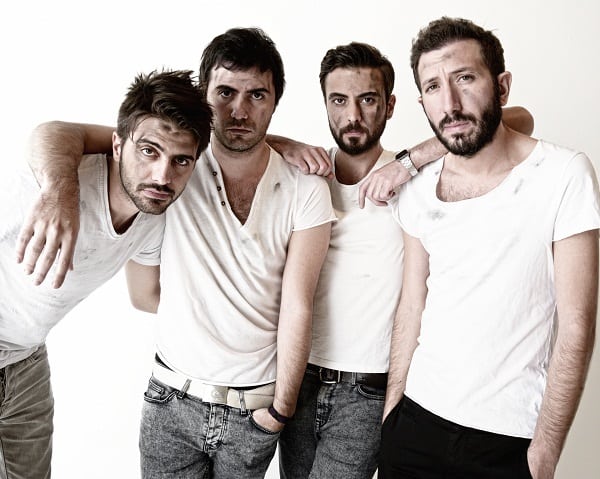Istanbul-based band Gece released their third album Iyi Niyetti Bir Gün on 6 May. To mark the occasion, I sat down with bassist Gökçe Balaban for a chat about the band’s early days and the year leading up to the album’s release.
Gece, meaning “night” in Turkish, is also the combined initials of the band members’ first names. The four-piece indie pop/rock outfit is made up of Gökçe Balaban on bass, Eren Çilalioğlu on drums, Can Baydar on guitar and Erdem Başer on guitar and vocals. They formed 14 years ago in Ankara. The latest album, Iyi Niyetti Bir Gün, follows İçinde Saklı (2008) and the self-titled Gece (2011), which features the band’s hugely popular “Ben Öldüm.”

Can you tell me about the band’s beginnings?
We met in Ankara. Originally it was just Eren and Can. They formed in 1999. I joined in 2000 and then Erdem a while later. We started off playing and performing in and around Ankara. We used to do gigs in Manhattan, If and Limon Bar quite a lot. It was also in Ankara that we met our producer, Koray Candemir. We moved to Istanbul in 2008. It was an obvious move really. Istanbul is the ‘place to be’ for music in Turkey. There is of course some nostalgia though when we’re back in Ankara.
What were your early influences in terms of musicians?
For all of us The Beatles were a big influence. We all loved them. And Can’s Mum was obsessed with them too. Apparently she would put on Beatles tracks then press the headphones to her stomach when she was pregnant with him. For me it’s impossible single out any song but my favourite album is probably Abbey Road. Though Sgt. Pepper’s Lonely Hearts Club Band is also impressive.
In terms of Turkish influences, Barış Manço and Cem Karaca were big influences. As was the rock movement of the 70s. But our influences have changed over time.
Last summer, you released the single “Başıma Gelenler” with Nilüfer, which appeared on her album, 13 Düet. Was working with Nilüfer your first collaborative piece? How was it working with her?
It was our first project with another artist in which we all worked on the material. It was amazing working with Nilüfer. She has been on the Turkish music scene for ages (she was Turkey’s representative at Eurovision 1978) so it was great to work with someone we all grew up listening to as children. The song was for her collaborative album Nilüferle 13 Düet, where she sang duets with various other Turkish musicians.
Last year the band was asked to write the official song for the U-20 World Cup in Turkey. You guys then performed this song, “Yıldızlar Buradan Yükseliyor,” at the final. That whole experience must have been great — does Gece have much of an international following?
Yes it was interesting. We were offered the opportunity to write it so we took it. But honestly, it was a bit disappointing. The excitement levels surrounding the whole thing were pretty low. And when we performed to a 3/4 full Turk Telecom Arena for the final, it was done on playback so that felt really strange. So all in all an interesting experience but not really as exciting as it could have been.
In terms of an international following, there isn’t really one. And what there is, is due to the Internet. But the biggest following outside Turkey is definitely in Europe, and also some in Azerbaijan. We had one fan who got in touch from Brazil, which was cool.
2013 was clearly a busy year for Gece — you started working full-time on the new album in late 2012 and continued through 2013. The plan was to start recording in July 2013. Did the protests in Turkey last June affect the album’s development and, if so, how?
Yes, it definitely affected it. All aspects of the production came to a standstill. But it was paradoxical in that sense as it also fueled our creativity. It was difficult to concentrate on work — of course it was! But it shaped and affected us. It was an immensely important time. For me, put simply, it was the first mass civil political movement in Turkey.
Would you say there is a sense of responsibility among artists (of all forms, not just music) to record the Gezi Park protests in their work?
Absolutely. I would say the chance to express an opinion on the issues via our (artists’ in general) tools awakened a political agency. If the role of artists is to reproduce reality in a different form then there is a responsibility to record Gezi. There is also a responsibility to raise and to sustain a popular consciousness of Gezi and what it represented for Turkey.
Our songs have generally focused on the themes of relationships with other people, with yourself, with love. Our new album is similar to this, but there are also two resistance songs in there, “Zamanın Ruhu” and “Uyandım.” There is no overtly political message, but Gezi was impossible to ignore for us.
In terms of the near future do you have any gigs or festival appearances coming up?
Yes, we’ll be playing at the One Love Festival on 14-15 June, which should be great.
—-
Gece’s new album is available in full at Deezer or Spotify. To find out more about upcoming gigs and appearances, visit their website. They are also on Facebook and Twitter.









